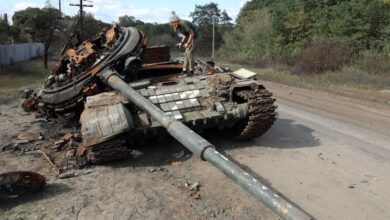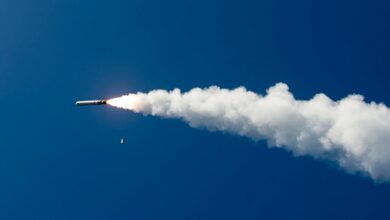
Why do we need to worry about Putin’s irredentism?
Answer in one map.
Vladimir Putin justifies his war crimes in Ukraine through ethnonationalist and anti-Semitic rhetoric. In his speech announcing a “special military operation,” Putin remarked Ukraine’s existence was wholly tied to Russia’s predecessor, the USSR. Further, he claimed Ukraine and Russia are one people.
His July 12, 2021 article explains what he was referring to in much more detail.
In short, the Russian president does not believe Ukraine is legitimate or has the right to exist. Additionally, Putin claims the Ukrainian language is simply a “dialect” of Russian. He denies Ukrainian history to include the forced famine of millions of Ukrainians in Joseph Stalin’s forced collectivization of farms.
What’s more, he makes the interesting claim Russia’s ancestral lands are Kyivan Rus.
His remarks are clearly disturbing — but what are their implications? Take this belief to its natural end. To think through the implications of his truly held beliefs, we need to understand what Kyivan Rus and Ukraine are and why it matters to Putin’s narrative.

History of Kyvian Rus
There is no way to do a complete and exhaustive accounting here, but these are the broad strokes. Because there are few records of Kyivan Rus, the history of the federation is disputed but can more or less be put together from books and documents of this era.
The Rus probably originated in the coastal regions of Sweden in the 8th century.
In the 9th century, Rurik, likely a Norse prince, founded and governed the principality Novgorod or “New City.” Upon his death, Novgorod was passed to his brother Prince Oleg, though the relation is disputed.
Nonetheless, Oleg would travel down the Dnieper, seize Kyiv, and transfer his power there, making Kyiv the new capital. This was the start of Kyivan Rus; it was a federation of Slavic peoples with individual principalities that encompassed much of today’s Eastern Europe.
Kyivan Rus would last until the mid-13th century when the Golden Horde razed it to the ground. The Golden Horde scattered this region’s peoples into three main areas: modern-day Russia, Ukraine, and Belarus.
Russia would develop largely separately as it was absorbed into the Horde as a vassal. Modern-day Ukraine would become part of the Grand Duchy of Poland and Lithuania, developing along more European lines just as the notion of states was created.
As a result, their cultures, histories, language, and identities took on distinctive characteristics, even if they shared part of the same religious history.
The multiethnic land we know today as Ukraine would eventually be absorbed into Russia under Catherine the Great in the late 18th century. Campaigns of Russification, pogroms, and various Russian nationalist projects over the next 100 years attempted to suppress the region’s language and identity.
However, shared collective trauma and experiences would bind the diverse groups against a common enemy looking for independence. This goal was briefly achieved from 1918 until 1920. Ukraine would become the foundation for the creation of the USSR and its structure of ethnic republics.
It is often said there would be no USSR without first the resolution of “the Ukrainian question.” Their final independence came as the USSR collapsed in 1991.
Putin’s Justification
Regardless of the Putin narrative, it is clear that while certain parts of Ukrainian and Russian history overlap, this does not negate the unique Ukrainian culture, language, and history.
Furthermore, the state was created and territories drawn, along with the Russian Federation, Belarus, and all other entities after the 1991 fall of the USSR. Regardless of these disputes rooted in the past, Ukraine’s identity is real, and so it’s statehood.
What does all of this mean? If Putin does not have Ukraine’s right to exist as his operating premise, and that Kyivan Rus is Russia, he is saying all the land in red is historical Russia. This is the foundation for the justification of his actions in Ukraine today.

Understanding Kyivan Rus would today equate to parts or all of Poland, Romania, Moldova, Hungary, Czech Republic, Slovakia, Lithuania, Latvia, and Estonia. This has dangerous implications for European peace and the international order.
Putin’s comments, backed by his revanchism in Ukraine, are a security dilemma to the sovereignty of these states, and by extension, the security of Europe. A truly imperialist Putin was something few took seriously until last week. Who is to say Poland is not next? Or Estonia?
Ethnic Russians
Putin has also said the Russian Constitution gives him the right to protect Russians anywhere, including the right to cross state lines if required. In fact, this was the technical excuse he used to invade Ukraine. So where are ethnic Russians?
Below is a map of the USSR. To give you an idea of scale, it spans 11 times zones, 13 if you include the communist satellites of Central/Eastern Europe. Mongolia, Kazakhstan, Uzbekistan, Belarus, and most other USSR Republics are independent sovereign states today. Many states still have populations of ethnic Russians.

But are these really the only places with enclaves of Russians? In America, there are several such as Chicago, St. Petersburg, Florida, and Brighton Beach, NY, to name a few. The reality is ethnic Russians live virtually all over the globe.
In other words, nowhere is safe from Putin’s imperialism or threat of war.
Putin’s Security Dilemma
Unfortunately for Mr. Putin, we live in modernity and not the age of empires. We have forged a post-WWII order dependent upon rules and norms, particularly those outlined in the UN Charter that Russia is a signatory to.
Russia cannot have its cake and eat it too. Putin cannot participate in the international community, hold power in the UN as a permanent Security Council Member, and then flagrantly violate those norms.
Strangely, for all his revanchism, Putin seems to have miscalculated the strength and will of the Ukrainian people. While he may have violated its territory, disrupted internal sovereignty, and destroyed bureaucratic structure, he is not achieving his short-term goals of seizing Kyiv in a quick and decisive battle, nor has he captured President Volodymyr Zelenskyy.

Putin hoped to create a security dilemma for the Ukrainian president by exploiting what he believed was low support for Zelenskyy and Ukrainians welcoming Russia as a liberator.
Perhaps he believed this narrative because he was getting poor information from his advisors, who have only served to rubber stamp whatever he wants for fear of reprisals. Whatever his reason, it is clear he is desperate.
His actions reek of an old tyrant dismayed at the disintegration of his global power who seeks to regain relevance by projecting his weakness in the form of military might on his neighbors.
The result is he has ultimately created his own security dilemma around the world and at home. He has caused Russia to become an isolated pariah state. Russia has been kicked out of the Council of Europe, and talks are underway to block Russia in the UN Security Council.
He is subject to target sanctions that will see him and his ilk lose beloved toys like yachts and property.
Perhaps most importantly, he is facing stiff resistance at home from his own people who have taken to the streets in droves despite harsh laws prohibiting protest and the threat of arrest.
More than 6,000 have already been arrested, and their ire does not seem to end. He is creating the circumstances that may lead to his ouster or at the least to his great consternation and concern.
Is Putin’s war solely about identity? No. But it drives him; it is the main foundation he has laid to justify any actions in Ukraine.
If this ethnonationalist narrative is his operating premise, Europe, nor the world, is safe. We must resist it as we resisted other irredentist leaders who thrust us into WWII.
Over 14,000 Ukrainians have died holding the line for Europe since 2014. Numbers in the current conflict are unclear.
 Nicolè M. Ford specializes in democratization and democratic backsliding in Central and Eastern Europe and Russia. She teaches courses on comparative politics at The University of Tampa.
Nicolè M. Ford specializes in democratization and democratic backsliding in Central and Eastern Europe and Russia. She teaches courses on comparative politics at The University of Tampa.
The views and opinions expressed here are those of the author and do not necessarily reflect the editorial position of The Defense Post.
The Defense Post aims to publish a wide range of high-quality opinion and analysis from a diverse array of people – do you want to send us yours? Click here to submit an op-ed.











